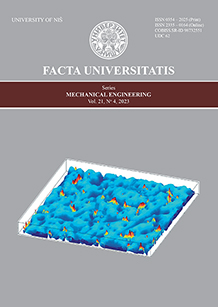A HYBRID DEEP LEARNING APPROACH FOR SENTIMENT ANALYSIS IN PRODUCT REVIEWS
IF 11.8
2区 工程技术
Q1 ENGINEERING, MECHANICAL
引用次数: 0
Abstract
Product reviews play a crucial role in providing valuable insights to consumers and producers. Analyzing the vast amount of data generated around a product, such as posts, comments, and views, can be challenging for business intelligence purposes. Sentiment analysis of this content helps both consumers and producers gain a better understanding of the market status, enabling them to make informed decisions. In this study, we propose a novel hybrid approach based on deep neural networks (DNNs) for sentiment analysis in product reviews, focusing on the classification of sentiments expressed. Our approach utilizes the recursive neural network (RNN) algorithm for sentiment classification. To address the imbalanced distribution of positive and negative samples in social network data, we employ a resampling technique that balances the dataset by increasing samples from the minority class and decreasing samples from the majority class. We evaluate our approach using Amazon data, comprising four product categories: clothing, cars, luxury goods, and household appliances. Experimental results demonstrate that our proposed approach performs well in sentiment analysis for product reviews, particularly in the context of digital marketing. Furthermore, the attention-based RNN algorithm outperforms the baseline RNN by approximately 5%. Notably, the study reveals consumer sentiment variations across different products, particularly in relation to appearance and price aspects.用于产品评论情感分析的混合深度学习方法
产品评论在向消费者和生产者提供有价值的见解方面起着至关重要的作用。分析围绕产品生成的大量数据(如帖子、评论和视图)对于商业智能来说可能是一个挑战。对这些内容的情感分析有助于消费者和生产者更好地了解市场状况,使他们能够做出明智的决策。在这项研究中,我们提出了一种基于深度神经网络(dnn)的新型混合方法,用于产品评论中的情感分析,重点关注所表达的情感分类。我们的方法利用递归神经网络(RNN)算法进行情感分类。为了解决社交网络数据中正负样本分布不平衡的问题,我们采用了一种重采样技术,通过增加少数类样本和减少多数类样本来平衡数据集。我们使用亚马逊的数据来评估我们的方法,包括四个产品类别:服装、汽车、奢侈品和家用电器。实验结果表明,我们提出的方法在产品评论的情感分析中表现良好,特别是在数字营销的背景下。此外,基于注意力的RNN算法比基线RNN算法的性能高出约5%。值得注意的是,该研究揭示了不同产品的消费者情绪差异,特别是在外观和价格方面。
本文章由计算机程序翻译,如有差异,请以英文原文为准。
求助全文
约1分钟内获得全文
求助全文
来源期刊

Facta Universitatis-Series Mechanical Engineering
ENGINEERING, MECHANICAL-
CiteScore
14.40
自引率
2.50%
发文量
12
审稿时长
6 weeks
期刊介绍:
Facta Universitatis, Series: Mechanical Engineering (FU Mech Eng) is an open-access, peer-reviewed international journal published by the University of Niš in the Republic of Serbia. It publishes high-quality, refereed papers three times a year, encompassing original theoretical and/or practice-oriented research as well as extended versions of previously published conference papers. The journal's scope covers the entire spectrum of Mechanical Engineering. Papers undergo rigorous peer review to ensure originality, relevance, and readability, maintaining high publication standards while offering a timely, comprehensive, and balanced review process.
 求助内容:
求助内容: 应助结果提醒方式:
应助结果提醒方式:


